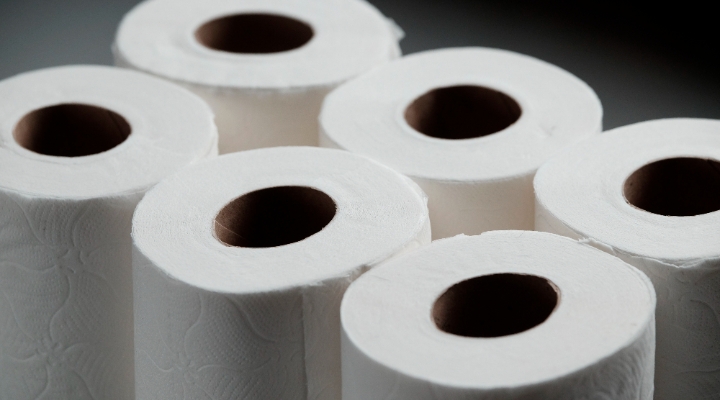
The UK's Loo Roll is Spenny
Brits are paying more for loo roll, butter and ketchup than our European neighbours. However, on the plus side we have cheaper tuna fish, frozen pizza, cooking oil and nappies than shoppers on the continent. As inflation remains stubbornly high — and UK supermarkets and food companies are accused of "greedflation" (profiteering from rising prices) — research this week looked at the cost of 23 everyday items across the UK, France, Germany, Spain, Italy and the Netherlands, to see who is paying more. The study found huge variation in the price of individual items, but overall Brits don’t seem to be losing out. UK shoppers are paying more for a basket of goods than Dutch or German consumers, but less than those in other European countries. France is the most expensive place to buy these items, and Germany the cheapest. The researchers say this reflects food taxation policies in France and the reach of discount supermarkets like Aldi and Lidl — which account for 80% of supermarket sales in these other countries, but just 17% in the UK.
The Mortgage Market is Looking Shaky
The housing market's foundations might need some more concrete. This week’s slew of bad news included data from Halifax showing the first annual house price fall for 11 years. Meanwhile HSBC, which offered some of the cheapest home loans on the market, pulled all its fixed-rate mortgages, with next to no notice to brokers or borrowers. The bank is expected to relaunch its product range next week, but at a significantly higher price point. The bad news didn’t stop there. It also emerged this week housebuilding in the UK has slumped to its lowest level since the financial crash. Conversely, this could act as a brake on any house price correction, with an imbalance between supply and demand being one of the factors causing prices to spiral in recent decades. But this isn’t good news for potential first-time buyers though: no significant fall in house prices and higher interest rates make it yet harder to get on the property ladder.
Percy Pig Has Won His First Big Battle
After M&S’s Colin the Caterpillar saw off copyright infringements from Aldi’s Cuthbert caterpillar cake, there was a similar victory this week for the retailer’s all conquering Percy Pig brand. M&S reached an amicable agreement with confectioners Swizzels, who will now redesign their strawberry-flavoured pig-shaped foamy sweets, known as "Pig Mugs". Sadly no-one at Swizzels’ marketing team thought to call them Swine Gums.
There's Nothing Cryptic About Crypto Warnings
Cigarette packets carry health warnings, and firms selling crypto-currency investments will soon have to include similarly stark wealth warnings to potential investors. Customers will be told to "prepare to lose all the money you invest" and warned there is no protection or safety net should something go wrong. In addition, crypto firms will have to remind people to think twice before making an investment and introduce a cooling off period for first-time buyers. These regulations, due to come into force this Autumn, come as figures show crypto ownership more than doubled between 2021 and 2022 — with 10% of the consumers surveyed by the FCA now owning crypto assets. This intervention comes as US regulators sue two trading platforms, Binance and Coinbase, for alleged regulatory breaches.
Newspapers Are in The Headlines
Social media companies frequently make the headlines due to the antics of their bosses. But this week it was the turn of old-fashioned "mainstream" media brands. The Daily and Sunday Telegraph, along with stablemate The Spectator magazine, are up for sale due to debts owed by their parent group. Receivers have taken control of the group, leading to speculation as to who might buy the Conservative-leaning "Torygraph" titles, which boast Boris Johnson as a former columnist (Johnson was editor at the latter). Over in the US it was TV channel CNN in the news after the shock departure of its chief Chris Licht after just 13 months. Licht, who was chairman and chief executive, had come under pressure after programming misfires, an unpopular redundancy programme, publicly criticising his predecessor, and, most recently, admitting in a magazine article he knew the crowd for the widely criticised town hall with president Donald Trump would be "extra Trumpy".
Apple Just Took a Chunk Out of Facebook's VR Market
It’s a good job Apple is changing the autocorrect on its text messaging service this week. Previously a common swear word had reverted to "ducking", but enthusiasts will now be able to use the more x-rated version when contemplating the price tag of the company’s new virtual reality headset: $3,499 (£2,899). Apple isn’t calling this Vision Pro a VR headset but is styling it as an augemented- or mixed-reality experience, with users able to see digital content projected onto their surroundings. There are a few glitches to iron out, but the tech journalists invited to test it at the company’s launch seemed genuinely impressed. Apple says it wants to shift almost one million Vision Pro units when it goes on sale next year, although Morningstar analysts explain this might be an optimistic forecast.
Shell is Shocked by Greenwashing Ruling
The Advertising Standards Authority is getting tough on "greenwashing", demanding oil giant Shell pulls its recent advertisements on renewable energy programmes. The ASA says these ads, which featured renewable electricity and car charging points, gave a misleading picture to consumers by failing to mention that most of its business is in polluting fossil fuels. The ASA also required Spanish energy company Repsol and Malaysia’s Petronas to remove ad campaigns for similar reasons. Shell said it "strongly disagrees" with the findings, and complained this potentially holds back green innovation, by stopping large conglomerates promoting more sustainable product ranges. The ASA though clearly feels consumers need a more realistic overview of a company’s environmental track record —with similar action taken recently against Etihad Airways and Lufthansa as well as HSBC.
The Battle of the Business Lobby Groups is *ON*
The Confederation of British Industry (CBI) this week survived a crunch vote with its (remaining) members, who approved reforms to the business lobby group after a series of misconduct allegations. But it now faces competition from a rival outfit: the British Chamber of Commerce. It is plotting a new "council" for business big hitters "who are looking for a different kind of representation". The BCC said BP, IHG Hotels, Drax and Heathrow are involved and will have talks with president Martha Lane Fox. Meanwhile Siemens, Microsoft UK and Esso have publicly backed the CBI reforms. It is all starting to sound a bit like the People’s Front of Judea and the Judean People’s Front. Let the battle commence.
Banks Are Being Bashed For Abysmal Savings Rates
Banks have been criticised by MPs for the "measly" interest paid on their savings accounts. This follows evidence given last year by the bosses of the UK’s leading banks, which, it has been noted, was the highest-paid panel to sit before the Treasury Select Committee ever. Bank chiefs have put forward a somewhat half-hearted defence, claiming MPs were wrong to focus on easy access accounts (paying between 0.7% and 1.35%) when regular saver deals offer up to 7%. Of course, this argument fails to acknowledge savers can typically only save around £3,000 a year into such offerings, and this is drip fed in month by month, meaning later payments don’t benefit from the full 7% for a whole year. MPs concluded high street banks need to "up their game" and do more to encourage savings habits. It's timely too: figures this week showed the value of savings deposits fell 4% in March.
ESG's Taps Are Slowing to a Drip Too
UK investors ditched sustainable and ethical funds at a record rate in May. This was only the second month there have been more net sellers of ESG funds than buyers. The trend may have been exacerbated by investors moving out of equities altogether, amid volatility and rising returns being available from money market funds and bank deposits. But it could also reflect the relatively poor performance of many ESG funds in the last 18 months, as these environmental and socially-conscious fund holdings tend to be underweight in oil, gas and mining. At the same time, many have overweight positions in technology stocks — typically seen as having a lower carbon footrprint — and they have struggled to deliver the growth seen during the Covid-19 pandemic. While one month’s figures hardly signals a fundamental shift in investor behaviour, the size of this drop, suggests ESG investing isn’t the entirely- unstoppable juggernaut many presumed it to be.





























